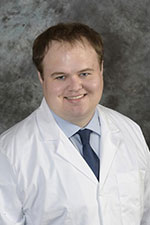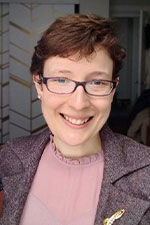Our Fellows
1st Year Fellows
Kelly Russo, MD
Residency
Internal Medicine, University of Rochester
Hometown
Nowalk, CT
Why did you choose Rochester?
Rochester felt like home. Between the unique opportunities to work alongside expert faculty in a dynamic and collaborative environment, the robust research opportunities, and the unparalleled patient care, URMC was my first choice. With a rich tradition of clinical excellence, fellows can expect to be immersed in a dynamic learning environment, gaining hands-on experience in diagnosing and managing a wide spectrum of infectious diseases. The fellowship's emphasis on interdisciplinary collaboration ensures exposure to diverse perspectives and approaches, enriching the learning experience and preparing fellows for the complexities of infectious disease management. Additionally, the program's strong mentorship from esteemed faculty leaders in the field offers invaluable guidance and support for professional growth and development. Furthermore, the fellowship's affiliation with a diverse patient population and cutting-edge research opportunities enhances the training experience and equips fellows with the skills and knowledge needed to excel in their future careers as infectious disease specialists.
Why did you choose Infectious Diseases?
I was driven towards the field of Infectious Diseases through my passion for scholarship, devotion for hands-on patient care, and unyielding hunger for knowledge and understanding. ID affords me the opportunity to connect with a diverse patient population and disease processes. I enjoy challenging myself to piece together complex contextual clues and potential solutions. I feel my life is more enriched when I am able to partner with patients struggling with socioeconomic difficulties and chronic illnesses. ID allows me to have all these opportunities and more.
Entering infectious diseases fellowship is the fulfilment of an aspiration born more than two decades ago when I began reading about physician scientists who traveled the world to study and control emerging pathogens. While I am still passionate about global health and tropical medicine, working as a hospitalist over the last several years has brought into focus some of the biggest challenges we face in our own country and has further cemented my desire to become an infectious disease physician.
Research Interests?
As I progressed through residency, my decision to pursue a career in Infectious Diseases was reinforced by a new-found captivation by the impact of intricate molecular-level interactions on pathogenesis. This passion was driven by a case of Neisseria sicca bacteremia arising due to the terminal complement-inhibiting effects of eculizumab. I later felt a call to address the ever- advancing field of pathogen evolution and seek knowledge through the local antibiogram. Through my research on P. aeruginosa resistance patterns in left ventricular assist device- associated infections, I gained an immense appreciation for techniques employed to manage these chronic, continuously evolving infections, and hope to further our understanding to reduce the development of resistance.
Career Plans?
One of my aspirations is to help establish updated IDSA guidelines for the management of chronic P. aeruginosa infections. By doing so, I hope to make a meaningful and widespread contribution to the future of the field. Long-term, I am hoping to work in an academic institution to continue to spread my passion for ID with future generations, expand my research, and most importantly, be by the bedside of my patients every step of the way.
2nd Year Fellows
Patrick Passarelli, MD
Residency
UC San Diego Internal Medicine and Pediatrics Residency
Hometown
Omaha, NE
Why did you choose Rochester?
After falling in love with the Finger Lakes Region, a spectacularly beautiful area that is home to lush forests, storybook waterfalls, and a unique outdoor culture, I am excited to move to its largest and gateway city to pursue my passion of infectious diseases. The University of Rochester is the academic tertiary referral center for the hospital where I worked for several years, so I knew its reputation for excellence and the highest level of care in our region. As a med-peds physician, I value the robust med-peds presence and culture here. I was immediately impressed by the faculty who are approachable, friendly, and supportive.
Why did you choose Infectious Diseases?
Like others before it, the pandemic has put sharply into focus how the field of infectious diseases unites human, animal, ecological, and global health. Our work requires that we come to know patients holistically - who they are, what they do for work and leisure, what they eat, their relationships to other people and creatures and to their internal and external environments. It is a lens through which we examine the triumphs and failures of our society and an avenue by which we advocate for the vulnerable and marginalized.
Entering infectious diseases fellowship is the fulfilment of an aspiration born more than two decades ago when I began reading about physician scientists who traveled the world to study and control emerging pathogens. While I am still passionate about global health and tropical medicine, working as a hospitalist over the last several years has brought into focus some of the biggest challenges we face in our own country and has further cemented my desire to become an infectious disease physician.
Research Interests?
My research interests include the effect of sleep on outcomes of infections, immune dysfunction in cirrhosis, infections in people who inject drugs, infections in incarcerated populations, sexually transmitted infections, antibiotic stewardship specifically in asymptomatic bacteriuria, pediatric pneumonia, use of procalcitonin to guide antimicrobial therapy, fungal infections and biomarkers, optimal management of immunomodulators in patients with solid organ transplant with active infections, echinococcosis and its spread in North America, and outreach and optimization of infectious diseases management in community hospitals.
Career Plans?
Given that my career has been non-linear thus far, I have a very open mind about what the future may bring. Ideally, I would like to find a way to integrate my interests in antimicrobial stewardship, global health, addiction medicine, and hospital medicine. I am also passionate about medical education and am interested in serving in leadership roles for residency training programs.
Colin Samoriski, MD
Residency
UR Internal Medicine Residency Program
Hometown
Victor, NY
Why did you choose Rochester?
While the clinical training, academics, and research opportunities offered by the University of Rochester are second to none, the people are really what make this institution special. As a resident here I experienced first-hand the collegial and supportive environment fostered by the University of Rochester. The breadth of ID training available and the support of faculty advisors opens the door to many exciting opportunities.
Why did you choose Infectious Diseases?
The practice of infectious disease medicine encompasses the entirety of medical care. It involves all disciplines and all organ systems. The archaic back-and-forth struggle of adaptation between microbe and host is never-ending and spans all eras of medicine. Infectious disease is a fascinating field.
Research Interests?
Currently my research primarily involves outpatient antibiotic stewardship. I hope to expand my research interests as I shape my clinical interests.
Career Plans?
I hope to find a balance between patient care and clinical research as I further narrow my interests as a fellow.
Palina Sudnik, MD
Residency
St. Luke’s University Health Network Internal Medicine Residency
Hometown
Brodheadsville, Pennsylvania; Minsk, Belarus
Why did you choose Rochester?
There are several reasons why I chose Rochester. First, The University of Rochester Medical Center has all of the essential resources for a well-rounded Infectious Diseases Fellowship. Trainees encounter a wide spectrum of pathology here as the hospital is a referral center for complex cases. Additionally, there are a variety of specialized Infectious Disease Clinics affiliated with the network. The collaboration with the University of Rochester provides a wealth of research and educational opportunities.
On the interview day, I met faculty who were enthusiastic about teaching and mentorship. The fellows were welcoming and passionate about their experience in the program.
I also love Rochester for its vibrant culture and diversity; the city offers much to explore and enjoy.
Why did you choose Infectious Diseases?
I like the role of Infectious Disease (ID) specialists within the hospital and the health care system. ID doctors are often involved in the care of sick patients as part of multidisciplinary teams. They advocate for rational and evidence-based use of tests and therapeutics.
I feel this specialty is important. Progress in ID plays a crucial role in the longevity and quality of life of people. Since I was first trained as an ID doctor in my home country 10 years ago, I have observed triumphs in the field of ID, such as hepatitis C becoming curable, and millions of lives being saved during the SARS-CoV2 pandemic with the novel vaccines.
ID will always be in demand as the world of microbes evolves hand in hand with the environment and technologies.
Research Interests?
My research interests include: hospital and community epidemiology, MDRO, & fungal opportunistic infections.
Career Plans?
My goal is to work in an academic setting and balance clinical work with research.
Combined Adult/Pediatric Fellowship
Tyler Stephen, MD

Residency
University of Rochester Internal Medicine/Pediatrics Residency Program
Hometown
Littleton, CO
Why did you choose Rochester?
I chose Rochester for the program’s flexibility and wide range of exposures. The faculty and fellows are super welcoming and there is a close relationship with the pediatric infectious diseases department.
Why did you choose Infectious Diseases?
I really liked the idea of being the expert on a medical team without having to subspecialize in one specific organ system. I also love trivia and ID really encourages using a breadth of knowledge to help make diagnoses and treat patients.
Research Interests?
My research interests are mostly around vaccines and vaccine hesitancy at the moment.
Career Plans?
I am pursing a combined med-peds fellowship and my goal is to practice clinical infectious diseases with both children and adults.
Research Pathway Fellow
Rachel Simpson, MD, PhD

Residency
University of Rochester Internal Medicine Program
Hometown
Davenport, IA
Why did you choose Rochester?
When I interviewed at Rochester, I was struck by the collaborative atmosphere as well as the enthusiasm for fostering top notch research and innovative educational initiatives. As a resident, here, I found the culture to be incredibly supportive and I love the breadth of pathology we are exposed to, from basic foot infections to heart transplant patients. I am very grateful to have been here throughout the pandemic and am looking forward to working in the Infectious Diseases division as a fellow.
Why did you choose Infectious Diseases?
I have both a BS and PhD in microbiology and have always been fascinated by human-pathogen interactions. This naturally led to a clinical interest in infectious diseases!
Research Interests?
In research, I love big data and using novel computational approaches to tackle sticky clinical problems. In my PhD, I studied RNA editing in Trypanosoma brucei, the causative agent of African Sleeping sickness. In fellowship and beyond, I’m interested in exploring the utilization of different types of large data, such as deep sequencing and large scale proteomics, to improve diagnostic and prognostic measures.
Career Plans?
My goal is to stay in academic medicine with a balance of research and clinical time.